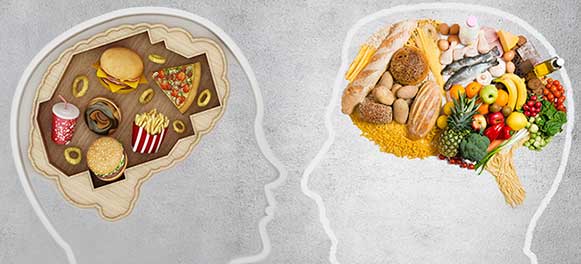Can Your Brain—Not Your Belly—Control Your Appetite?

As emerging research continues to question the usefulness of willpower, two new studies suggest that the brain and, specifically, how we think about food may actually influence appetite and potentially control food cravings.
The studies were presented in early November at The Obesity Society Annual Meeting in Boston, Mass. The first, led by Kathryn Demos, Ph.D., assistant professor of psychiatry and human behavior at the Miriam Hospital at Brown University, included 25 individuals who were overweight or had obesity. Participants were asked to use four cognitive strategies in random order as they reviewed pictures of enticing foods like pizza, French fries and ice cream:
- Distract: Think about something other than enticing food
- Allow: Accept one’s thoughts and recognize they are just thoughts that need not be acted upon
- Later: Focus on the negative long-term consequences of eating the food
- Now: Focus on the immediate reward of the food
Participants underwent functional MRI scanning while viewing the images and rated their urge to eat on a 4-point scale. From the scans, researchers were able to evaluate different strategies to reduce the desire to eat. The results showed that the “Later” approach was the most effective in reducing the urge to eat; it also increased brain activity the most in areas associated with inhibition of overeating. Researchers concluded that thinking about the long-term negative impact of eating these foods may be an effective way to reduce appetite.
“We found that simply thinking in a different way affects how the brain responds to tempting food cues in individuals with obesity,” explains Dr. Demos. “Through the MRI scans we identified that thinking about the long-term negative impact of eating unhealthy foods increased activity in a region of the brain involved in inhibitory control and self-regulation. Our results show the promising possibility that focusing on the long-term consequences of consuming unhealthy foods could help diminish cravings and, as a result, potentially enhance weight-loss efforts.”
The strategy replicates a similar and successful smoking-cessation treatment method, which researchers remodeled for obesity treatment. While this approach is not currently employed in standard behavioral weight-loss treatments, Dr. Demos says that future studies will examine whether incorporating this strategy into weight-loss treatments may be a viable new approach for clinicians to employ.
“We know that behavioral therapy is effective in helping people lose weight, but this study shows us a potentially promising new strategy to employ when working with patients,” suggests Chris Ochner, Ph.D., assistant professor of pediatrics and psychiatry at the Icahn School of Medicine at Mount Sinai, and incoming co-chair of TOS Public Affairs Committee. “There’s a lot we can learn from studying the brain and human behavior, especially eating behavior, and we hope to see more research in this area so we can provide better treatment to people with obesity and overweight.”
A second study, which included 55 participants with severe obesity, adds evidence to the current thinking that individuals can successfully reduce cravings using distraction tasks. For this study, Richard Weil, M.Ed., CDE, director of the New York Obesity Research Center Weight Loss Program at St. Luke’s Roosevelt Hospital Center in New York City, and his colleagues tested the effects of three, 30-second distraction techniques to reduce cravings for the study participant’s favorite foods. They found that the effect of tapping one’s own forehead and ear with their index finger, tapping one’s toe on the floor, or a control task of staring at a blank wall, all worked significantly to reduce the cravings. Forehead tapping, however, worked best out of all the techniques.
“The novelty of our study is that the subjects had severe obesity. The average BMI for the study participants was 43.7, or almost 83 pounds above what is considered the high end of the overweight category,” says Weil. “We showed that even with a high BMI, distraction techniques, and even the control technique, helped reduce the intensity of participants’ food cravings and the vividness of the image of their favorite foods. This reinforces the idea that it's possible to distract ourselves from craving even our favorite foods no matter how much we weigh, and this could be used as a weight-loss strategy.”

Applying the Science
What do these studies mean for fitness professionals? Providing clients with tools and strategies to help control appetite and make healthy food choices is essential. After all, learning how to employ behavior-change strategies—such as considering the negative effects of food choices or using distraction techniques—can be both effective and empowering for many people. The recently launched ACE Behavior Change Specialty Certification was created to help professionals learn the necessary practical and hands-on skills to help guide clients toward long-term lifestyle change. As these two studies confirm, people are far more likely to make better choices if they are taught the right approach.
References
Demos, K. et al. (2014). The effects of cognitive strategies in neural food cue reactivity. Obesity Week, November 27, 2014.
Weil, R. et al. (2014). Effects of simple distraction tasks on self-induced food cravings in men and women with grade 3 obesity. Obesity Week, November 27, 2014.
More Articles
- ProSource™: December 2014
Essential Exercises for an Optimal Strength-training Workout
Health and Fitness Expert
- ProSource™: December 2014
Best Exercises for Great Abs and a Pain-free Back
Health and Fitness Expert






